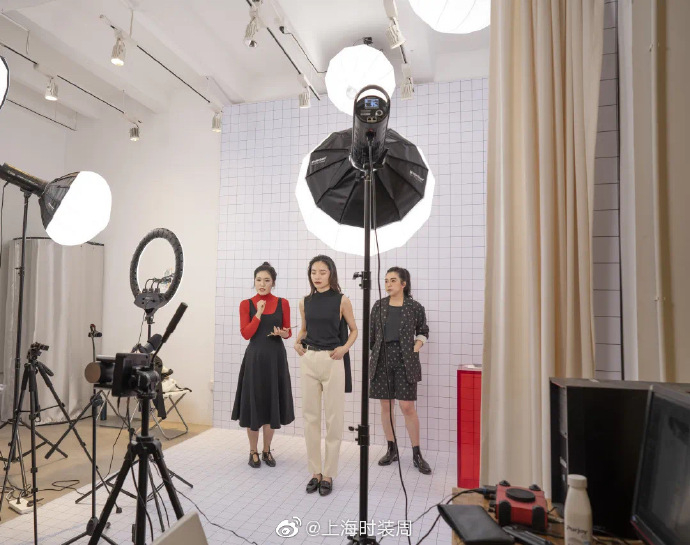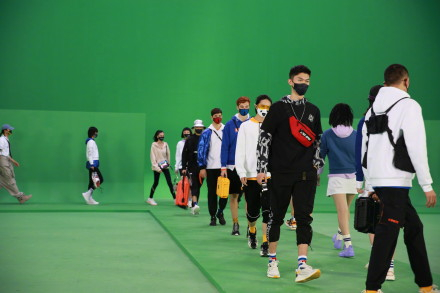
A model prepares for a runway show during the Shanghai Fashion Week: Spring/Summer Collections 2020 in Shanghai, October 13, 2019. /VCG
A model prepares for a runway show during the Shanghai Fashion Week: Spring/Summer Collections 2020 in Shanghai, October 13, 2019. /VCG
Last week, Paris men's fashion week and the haute couture shows, which were scheduled for June and July, announced they were canceling their runways over safety and health concerns, becoming the latest victims in the fashion industry to the COVID-19 pandemic.
The fashion industry has been hard hit by the global spread of the coronavirus, as design houses have shuttered their doors, and an increasing number of fashion calendar events and brands' runway shows have been axed.
Major fashion weeks have been an important platform for brands and designers to showcase their latest designs and a window for buyers to view the latest trends for the coming season.
Facing the coronavirus crisis, organizers of fashion weeks and brands have either called off the shows or found a new way to showcase their new collections and engage the buyers.

Models walk the runway during the Shanghai Fashion Week: Spring/Summer Collections 2020 in Shanghai, October 15, 2019. /VCG
Models walk the runway during the Shanghai Fashion Week: Spring/Summer Collections 2020 in Shanghai, October 15, 2019. /VCG
Shanghai Fashion Week's recent online experiment, widely considered a bold, groundbreaking move, might have provided a new solution and insight to the fashion world, many sectors of which are now in a state of paralysis.
A fashion fest, also an e-commerce extravaganza
In partnership with Alibaba's Tmall, the Shanghai Fashion Week (SHFW) launched a special edition of Tmall Cloud Fashion Week this year, from March 24 to 30.
"China's fashion industry and market have matured through the years and entered a new age of creative energy and boundless opportunities," said lyu Xiaolei, vice secretary of the SHFW committee, which decided to turn the crisis into an opportunity by transitioning online.

A host introduces the new design shown by a model through livestreaming during the Shanghai Fashion Week: Autumn/Winter Collections 2020. /Weibo
A host introduces the new design shown by a model through livestreaming during the Shanghai Fashion Week: Autumn/Winter Collections 2020. /Weibo
The seven-day event saw more than 150 brands and over 10 buyer shops and platforms join the online fashion fest, showcasing their 2020 autumn/winter collections while selling items from the current season via livestreaming to Tmall's 800 million active users.
Over 2.5 million people had watched the opening ceremony, and more than six million tuned in to the shows and interacted with the hosts on the first day.
Livestreaming had already been used by some luxury brands like Giorgio Armani to reach out to younger buyers, but still as the second fiddle to their on-site runway shows. Shanghai's online iteration, however, made livestreams the main focus in a world first.
Meanwhile, it unprecedentedly allowed customers to buy straight off the platform, integrating the buying options into the viewing experience, along with comment options on the new seasonal collections.

A model prepares for a runway show during the Shanghai Fashion Week: Spring/Summer Collections 2020 in Shanghai, October 13, 2019. /VCG
A model prepares for a runway show during the Shanghai Fashion Week: Spring/Summer Collections 2020 in Shanghai, October 13, 2019. /VCG
Some brands also held makeover sessions and panel talks following the showcases – all were broadcast via livestreams, creating real-time dialogue and interaction that are rarely seen in the traditional format.
As the first purely digital fashion week, it has not only presented a cluster of catwalk shows but also become an e-commerce extravaganza, a blend of virtual fashion shows, livestreams and panel discussions.
Crisis as a catalyst for online expansion
For many home-grown fashion labels like Angel Chen, city lockdowns, factory closures, and cancellation of orders in the past three months forced them to digitize their business plan for the next two years within two months.

Many of the catwalks took place with green screens to boost visual effects during the Shanghai Fashion Week: Autumn/Winter Collections 2020. /Weibo
Many of the catwalks took place with green screens to boost visual effects during the Shanghai Fashion Week: Autumn/Winter Collections 2020. /Weibo
The mature e-commerce ecosystem and domestic technologies drove the speed at which virtual fashion runways could be turned into an outlet of creativity.
CG, AR or VR technologies were combined to showcase the designs in an artistic approach and create a more entertaining experience. Many of the catwalks involved green screens to boost visual effects.
According to Mike Hu, head of Tmall Fashion, Luxury and FMCG, for this special edition of SHFW, some of Alibaba's most-advanced technologies were integrated to bring a new and elevated experience to brands and buyers.

A model prepares for a runway show during the Shanghai Fashion Week: Spring/Summer Collections 2020 in Shanghai, October 13, 2019. /VCG
A model prepares for a runway show during the Shanghai Fashion Week: Spring/Summer Collections 2020 in Shanghai, October 13, 2019. /VCG
"This partnership allows us to leverage our experience in digitizing brick-and-mortar retail stores and explore a new format for brand and product launches, which brings together technologies like livestreaming, short-form videos, DingTalk and Tmall Flagship 2.0 in a full-chain solution," said Hu.
Though some comments showed that the quality of the virtual shows varied due to the differences of hosts, lighting and settings, the digital fashion week enjoyed great popularity among the buyers and viewers, as it allowed everyone to become front-row viewers during the shows, creating a shortcut from high-end catwalk shows to daily online shopping.

Industrial insiders believe that the SHFW's online iteration offers great support for the scrambling designers and brands in current pandemic crisis. /Weibo
Industrial insiders believe that the SHFW's online iteration offers great support for the scrambling designers and brands in current pandemic crisis. /Weibo
Many insiders believe that despite the technical issues that need to be solved, such as upgrading servers to support tremendous online traffic and better curated livestreaming experiences, the SHFW has offered a new, efficient solution in the pandemic crisis, which could also be a catalyst for online expansion, digitalization and innovation for fashion houses and event organizers.
Masahiko Miyake, board chairperson of Japan Fashion Week Organization, said that it was remarkable to organize a special edition in such a short notice, adding that the online iteration has presented new possibilities for the participating brands and fashion weeks.
Boris Provost, president of French leading fashion trade show Tranoï, said the online special edition was "good and innovative," which is also inspiring for the show and fair organizers to develop fashion and business in the future.